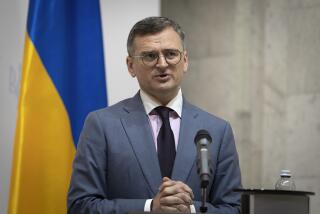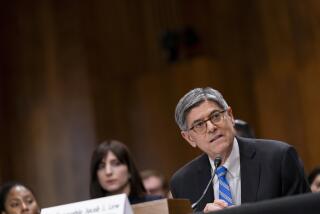Envoy to U.S. Appointed as Soviet Foreign Minister
- Share via
MOSCOW — Alexander A. Bessmertnykh, Soviet ambassador to the United States, was appointed foreign minister Tuesday, sending a clear signal that President Mikhail S. Gorbachev will continue his “new thinking” foreign policy, which thawed the Cold War’s icy relations with the West.
Bessmertnykh, 57, succeeds Eduard A. Shevardnadze, foreign minister for the last five years, who resigned last month to protest what he called the country’s “slide to dictatorship” and the rise of “reactionary forces” here.
Bessmertnykh told the Supreme Soviet, the country’s legislature, that he felt “some bitterness” at filling the post held by Shevardnadze, with whom he had worked closely in improving relations with the United States. “I deeply share his approach to international affairs as progressive, honest and responsible,” he said.
“After Shevardnadze’s resignation, people worldwide kept asking, ‘What will the Soviet foreign policy look like?’ ” Bessmertnykh continued. “I think the policy carried out for the last five years, the policy of new thinking . . . is the policy that fully reflects the national interests of our state . . . .
“The policy of a new thinking will be preserved, will continue and will develop.”
The appointment of Bessmertnykh (pronounced byes-MEHRT-neek) shows Gorbachev’s determination to maintain a steady course in his relations with the West and particularly the United States, where the new foreign minister has worked for almost 20 years during his career.
The appointment was announced amid harsh criticism of Gorbachev in the West for last weekend’s violent assault by Soviet troops on Lithuanian nationalists in which 14 people were killed.
Bessmertnykh, a career diplomat and seasoned negotiator, cautioned the West not to reverse its improving relations with the Soviet Union because of the Lithuanian violence.
“This is not the method the leadership intends to use in its interaction with the republics and its own people,” he later told journalists.
In response to questioning by legislators, Bessmertnykh stressed that the Soviet Union will not change its policy on the Persian Gulf crisis.
He said the Soviet Union will support the U.N. resolutions on the gulf but emphasized, as Shevardnadze had, that, in case of a war, “Soviet military forces will not take part in this act.”
Bessmertnykh has been a key figure in the improving relations between the two superpowers over the last five years, participating in all the Soviet-American summit meetings with the Reagan and Bush administrations.
He began his tenure as ambassador in Washington last May.
More to Read
Sign up for Essential California
The most important California stories and recommendations in your inbox every morning.
You may occasionally receive promotional content from the Los Angeles Times.












